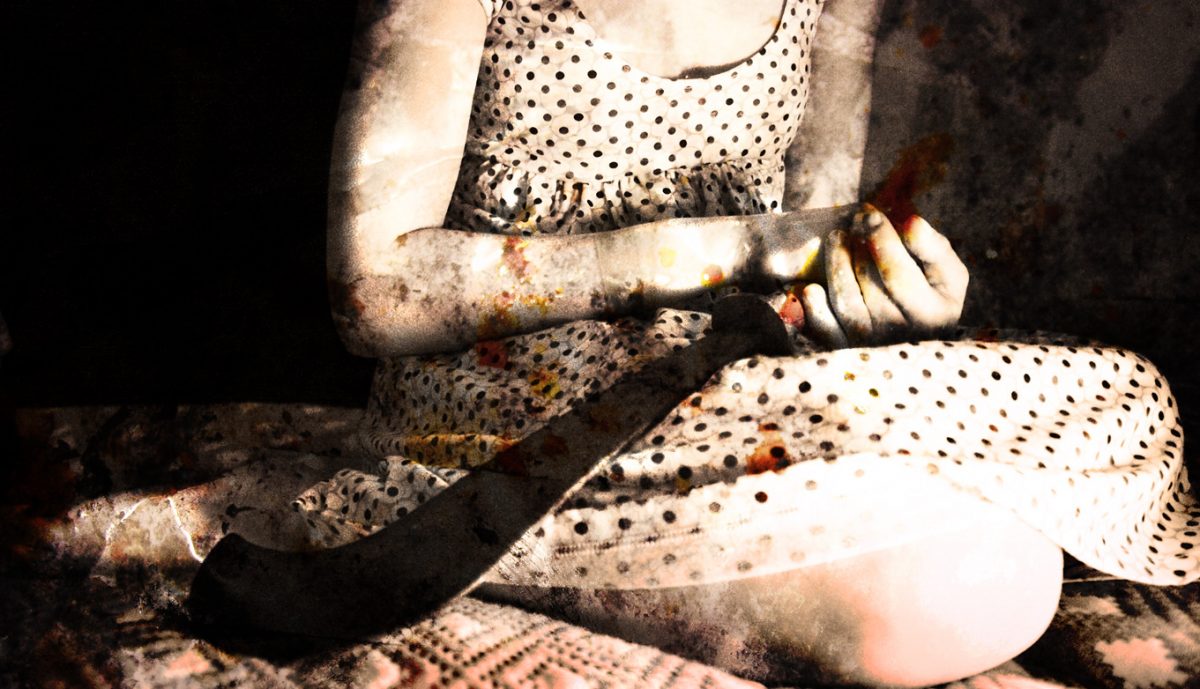Tara Betts
Estamos lejos de ser bendecidos
19 August, 2020

Tara Betts es autora de “Break the Habit”, “Arc & Hue” y “Refuse to Disappear”, próximo a publicarse. Además de su trabajo como artista docente y mentora de poetas jóvenes, Tara Betts ha enseñado en varias universidades, incluyendo Rutgers University y University of Illinois-Chicago. En el 2019 Tara publicó un poema en celebración del aniversario bicentenial de Illinois por Candor Arts. Tara es además editora para The Langston Hughes Review y Newcity.
Estamos lejos de ser bendecidos
para Bob Unanue
Oh nieto de inmigrantes
fresco en un traje azul, mientras parado
en el césped de la Casa Blanca
ignoras a un presidente
que deportaría a tu abuelo.
Tu abuelo entendió
oraciones cálidas viven en ollas familiares,
quienes saborean pequeños pedazos de hogar
para llenar vientres y pensamiento,
déjame abastecer los estantes de las tiendas de comestibles,
nutrir cada sonrisa que crece nuevos dientes
para niños lejos y cerca de casa.
Imaginó familias batiendo
la olla de lo familiar donde comienza Goy
como “oi” y termina con una bocanada de
“a” en ángulo como “uh”
pesado como una diosa africana
envuelta en púrpura y huracanes,
Oya recuerda todas tus palabras
como Goya repitiendo “¡Goyaway, ya basta!”
Si tu abuelo escucha esas palabras
mientras la gente se aleja de los gandules y el adobo,
y esquiva la sazón teñida, y otros regalos
que se asientan y desaparecen en las ollas.
Espero que el líder que alabaste
apile los ladrillos de tu destino,
mientras arrojan niños a las jaulas y los desaparecen.
Que las orejas de lata sean los pozos para tus súplicas.
Dices que hay que construir, rezar, prosperar
como las personas que almacenan
tus conservas y gastan dólares
para comer su camino hacia otro día.
No logras construir, rezar, prosperar.
Destruyes, maldices, ignoras.
No entiendes que si tu gente no está bendecida
tampoco tu lo estas?
Volviste cada etiqueta de Goya en una maldición
mientras puedas.
Cuando te amaba
Un tiempo me marcó sin saberlo
como si deletrearas un idioma de
mis antepasados en piedras,
de alguna manera empecé a recordar esas palabras,
deletreando y con señas, después en baile, luego en canto.
Una noche, te detuviste en un estacionamiento
donde comimos papas fritas
y Héctor Lavoe cantaba “Aguanile”
frase que rodó graciosamente
del español y Yoruba hasta que no me importó estar
en un estacionamiento vacío.
Abrí mi puerta y subiste al volumen
hasta que el asfalto hizo eco.
Mi falda blanca giraba en círculos alrededor
De tu auto y reí como campanas de oro.
Cuando la canción terminó, el hueco de las campanas
aplastó el badajo, como bolas arrugadas
de papel de aluminio usado.
El machete
Todas sus hijas tenían machetes,
no pistolas, pero cuchillas anchas,
hechas para cortar caña de azúcar, tallos gruesos
que crecen en el Caibarien cubano
que nunca volverá a ver.
Estaba orgulloso de darle brillo
al acero. Sonaba un ting singular
cuando estaba desenvainada. Él sonrió.
us ojos se iluminaron cuando insistí
en este regalo.
Su hijo me dio un anillo,
mi suegro tendría que darme
la cuchilla con mango largo
ya que yo sería la nueva hija.
Cuando fui de visita
Apenas contenía la risita sofocada
Mientras revelaba el metal reluciente
en la tenue sala de estar.
Mi propio machete
no es la exclamación que
se espera una nueva esposa.
Cuando el nuevo esposo se fue,
se llevó la mayor parte de su ropa
mientras estaba fuera de la ciudad,
y se llevó el machete, mi
única defensa contra intrusos
en un apartamento en el primer piso
con puertas corredizas de cristal.
Mi machete
el único regalo que dijo
tu eres mi hija.
——-
Tara Betts is the author of Break the Habit, Arc & Hue and the forthcoming Refuse to Disappear. In addition to her work as a teaching artist and mentor for young poets, she’s taught at several universities, including Rutgers University and University of Illinois-Chicago. In 2019, Tara published a poem celebrating Illinois’ bicentennial with Candor Arts. Tara is Poetry Editor at The Langston Hughes Review and the Lit Editor at Newcity.
We Are Far From Blessed
for Bob Unanue
O grandson of immigrants
crisp in a blue suit as you stood
on the White House lawn
and you ignore a President
who would deport your grandfather.
Your abuelo understood
warm prayers live in family’s pots,
who savored small pieces of home,
to fill bellies and thought
let me stock grocery store shelves,
nourish every smile growing new teeth
for children far and close to home.
He imagined families stirring
the pot of familiar where Goy starts
like “oi” and ends with a huff of
an angled A like “uh,”
heavy as an African goddess
draped in purple and hurricanes,
Oya remembers all your words,
like Goya echoing “¡Goyaway, ya basta!”
If your grandfather hears those words
as people turn from gandules, mix adobo,
and dodge dyed sazón, and other gifts
settling and disappearing from pots.
I hope the leader you praised
stacks the bricks of your doom,
as children are thrown into cages and lost.
May tin ears be the wells for your pleas.
You say build, pray, prosper
like the people who stock
your cans and spend dollars
to eat their way to another day.
You fail to build, pray, prosper.
You destroy, curse, ignore.
Don’t you understand if
your people aren’t blessed,
neither are you? You turned
every Goya label into a hex.
Uncross yourself while you can.
When I Loved You
A time marked me not knowing better
as if you spelled out some language
of my ancestors in stones, and somehow
I began remembering those words, spelling
and signing, then dancing and singing.
One night, you stopped in a parking lot
where we munched on fries from cardboard
boxes and Hector Lavoe sung Aguanile—
a phrase he wheedled gracefully from Spanish
and Yoruba until I did not care about being
parked in an empty parking lot.
I flung my door open and you turned
the volume up until the blacktop echoed.
My white skirt spun in circles around
your car, and I laughed like gold bells.
When the song ended, the hollow of each
bell crushed a clapper inside, into balls
crinkled as used aluminum foil.
The Machete
All of his daughters had machetes,
not guns, but wide blades meant
to cut sugarcane, thick stalks
that grow in Caibarien, the Cuban
town that he will never see again.
He was proud to give this glistening
steel. It sounded a singular ting
as it was unsheathed. He smiled.
His eyes brightened when I insisted
on this gift. His son gave me a ring,
my father-in-law would have to give
me the blade with a long handle
since I would be the new daughter.
When I returned to visit, his stifled
snickers were barely contained as
he revealed the gleaming metal
in the dim living room.
My own machete
is not the exclamation that one
expects from a new wife.
When the new husband left,
he took most of his clothes
while I was out of town, and
he took the machete—my one
defense against intruders in
a first-floor apartment
with sliding glass doors.
My machete,
the one gift that said
you are my daughter.

